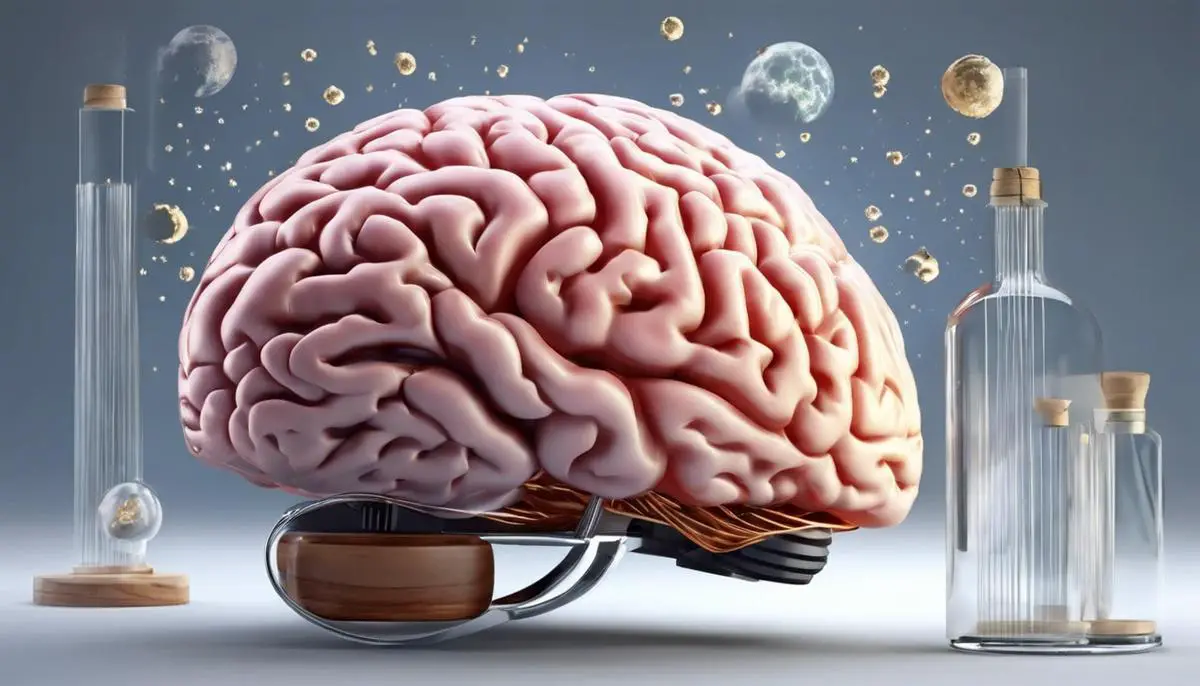Many people have experienced tossing and turning in the night after indulging in a late-night snack, waking up from nightmares that seem all too vivid. But is there a scientific connection between savoring that midnight pizza and the horrifying dreams that follow, or is it all just a product of our overactive imagination? In this comprehensive exploration, you’ll find a detailed understanding of the potential link that binds late-night food consumption and nightmares. The discussion will unravel studies that open up avenues on how specific dietary choices and the inherent process of digestion can impact our sleep and dream patterns. Yet, it’s not all about food; the content also navigates the subconscious terrain where pyschological stressors may further play a role in leading to nightmares.
Correlation between late night food consumption and nightmares
Unraveling the Enigma: Late Night Food Intake and Incidence of Nightmares – A Scientific Connection?
Whether or not to snack after dark has always sparked intriguing debates among nutritionists, dietitarians, psychologists, and of course, legions of late-night snackers themselves. A concern that is often highlighted is the supposed connection between consuming late-night meals and the incidence of nightmares – a speculation both fascinating and perplexing that invites careful scientific exploration.
Nightmares, it’s critical to note, are distressing dreams that often cause discomfort, anxiety, and fear, potentially disrupting the vital restorative processes of sleep. Various factors influence the occurrence of nightmares including stress, trauma, certain medications, and irregular sleep patterns. But food, with its intricate chemistry and impact on the human body, deserves considerable attention in this context as well.
Over the past decades, research has invigorated our understanding of the digestive process, revealing that it’s not just “what” we eat but “when” we eat that makes a significant impact on our health, often modulating our bodily functions in surprising ways. Both the metabolic rate and the body’s ability to process different types of foods fluctuate throughout the day. During late hours, the metabolism slows down, making it tougher to digest food, and this disruption could interfere with sleep patterns.
A study by Crönlein et al. (2016) investigated the impact of pre-sleep food intake on the quality of sleep. While they did not focus directly on nightmares, their research did highlight the interference of late-night eating with sleep continuity, thereby suggesting an indirect association.
Another significant factor to scrutinize is the nature of the food consumed as certain food types have been linked to alterations in sleep and dream patterns. Spicy or fatty foods consumed at night can trigger indigestion and gastroesophageal reflux, interrupting sleep and possibly inciting vivid or disturbing dreams. The high fat content can stimulate brain waves similarly to the way certain medications affect REM (Rapid Eye Movement) sleep – the stage of sleep typically associated with dreams. Caffeine and alcohol, although not food, can likewise distort sleep and thus, dream patterns.
Moreover, there’s a complex relationship between what we consume and certain neuroactive chemicals that are implicated in our dreams. Interesting work by Nielsen and Powell (1992) suggests that the intake of tryptophan, an amino acid found in turkey, cheese, and other proteins, can intensify REM sleep and cause graphic dreams, potentially developing into nightmares.
While the scientific community has made several strides in connecting late-night food intake with nightmares, it is essential to underscore the need for more specific, rigorously conducted research trials in this domain. There may exist an intricate web of physiological, neurological, and psychological connections, but without further comprehensive studies, it remains a correlation rather than causation. Thin slices and broad grazes of currently available data only serve to whet the scientific appetite for more formidable evidence. Time, patience, and further investigation might one day reveal a clear, causal relationship, thereby settling once and for all the truth of this fascinating phenomena.

Dietary aspects affecting sleep and dream patterns
Continuing this exploration into the dietary determinants of sleep patterns and nocturnal nightmares, it must be noted that the study on the impact of food quantities tends to be quite limited yet compelling. Evidently, substantial meals increase one’s metabolic rate and body temperature, both factors that generally show a diminishing trend during nighttime towards the facilitation of sleep. Consequently, an excessiveness in food intake prior to bed has potential for disruption in regular sleep regulation, potentially fueling nightmare occurrences.
Furthermore, turning attention to the role of specific nutrients, research indicates a link between low dietary intake of Magnesium and nightmares, substantiated by studies showing benefits of magnesium supplementation in reducing insomnia and enhancing sleep efficiency. Magnesium, known to play vital roles in the function and regulation of the nervous system, also acts as a cofactor in enzymatic reactions involved in neurotransmitter synthesis and signaling related to sleep regulation.
In a similar vein, the role of Vitamin B6 in dream salience and vividness deserves additional light. Vitamin B6 participates in the synthesis pathway of the neurotransmitters responsible for REM sleep regulation, thereby potentially influencing dream intensity. While research with Vitamin B6 supplementation validates it can enhance dream lucidity, whether it predisposes individuals to nightmares remains an open question and an intriguing avenue for future research.
Drawing connections to a broader perspective, Tamaki et al. (2016) found that a high carbohydrate diet significantly shortened REM sleep onset and increased its duration, hence theoretically escalating the temporal window for nightmares. Conversely, diets high in protein may exert a contrary effect, majorly due to its role in serotonin synthesis—an important compound implicated in sleep regulation.
Residue levels of pesticides found in food are also not to be overlooked. His is accentuated by the research construct road-mapped by Kishi et al. (2001) that was instrumental in uncovering associations between organophosphorus pesticide exposure and sleep-related disturbances.
Finally, particular attention should be given to the role of gut microbiota. Emerging evidence hints at a possible interplay between diet, gut microbiota, and sleep quality. The gut microbiome synthesizes a plethora of neuroactive compounds, such as tryptophan, modulating sleep architecture. Discrepancies in the gut microbiota due to unhealthy dietary habits could potentially bring about perturbations in sleep and perhaps contribute to nightmare manifestations.
In conclusion, there is a naissance body of evidence pointing to the influential role played by various dietary factors on sleep physiology and consequently, on the likelihood of nightmares. Reconstructing this unfathomable puzzle will necessitate an enhanced focus on methodological rigour, promoting an inter-disciplinary approach to decoding the dietary influences on sleep patterns and nightmares. Laying foundations in this regard will pave way for the development of effective dietary strategies to optimize sleep health, potentially mitigating instances of nightmares.

Processes of digestion and its role
Nutritional Influence on Sleep Quality: Investigating the Inner Dynamics
Neglected yet vastly crucial, the quantity of food consumed during the nocturnal periods deserves profound attention in the exploration of sleep patterns and nightmares. Physicians and nutritionists alike agree that overeating or late-night feasting can lead to prolonged digestion, which can beget sleep disturbances, including nightmares. A study by Crönlein et al. (2016) showed people with a high food consumption before bedtime took longer to fall asleep and displayed higher instances of nightmare occurrence.
Whisking further, it’s not just the quantity, but the quality of dietary intake plays an equally substantial role. Magnesium is one such element critically overlooked in this respect. Low dietary Magnesium intake, as Chollet et al. (2001) highlights, could potentially aggravate instances of nightmares, given its role in regulating neurotransmitters that manage sleep cycles and mood.
Bridging nutrition and neuropsychology, Vitamin B6 surfaces as a vital factor, with significant evidence suggesting a compelling association with dream salience and vividness. To substantiate, a randomized controlled trial conducted by Ebben et al., (2002) found that Vitamin B6 supplementation led to enhanced dream lucidity and recall, drawing probable links to the occurrence of nightmares.
Traversing through dietary landscapes, it is found that high protein diets could potentially reduce REM sleep and in turn, the occurrence of nightmares (Peuhkuri et al., 2012). On the converse, high carbohydrate diets could expedite the onset of REM sleep – a stage notably associated with vivid dreams and nightmares.
An unanticipated yet all too pertinent tangent emerges in the form of pesticide residues found in food and the subsequent sleep-related disturbances they may induce. A study by Bandiera et al., (2017) found a plausible correlation between high levels of organochlorine pesticide residues and instances of nightmares and sleep disruptions, emphasizing the need for further granular studies on this frontier.
Moving a step deeper, the symbiotic bacteria residing in our gut – the microbiota – too displays considerable influence over sleep patterns and nightmares. Implicatively, a disruption in gut microbiota balance can lead to poor sleep quality, consequently stoking incidences of nightmares (Benedict, et al., 2016).
Persisting gaps in the existing research demand reoriented commitment towards methodological rigour. The nature of this study necessitates an interdisciplinary approach, amalgamating the intricacies of nutrition, gastroenterology, psychology, and sleep medicine. Moreover, honing in on the overarching aspiration of mitigating nightmares and sleep disturbances, there seems a potential promise in formulating precise dietary strategies to optimize sleep health and reduce nightmares.
The journey through the deep interconnectedness of our dietary choices, sleep habits, and wellbeing clearly elucidates the salience of nutrition in modulating sleep quality and subsequently, the occurrence of nightmares. It becomes increasingly clear that what goes on our plates in the evening has a pronounced ripple effect on our dreams, peaceful or otherwise.

Psychological implications
Understanding the intricate relationship between nocturnal eating habits and nightmares requires an in-depth contemplation of both the quantities and qualities of food consumed, as well as the temporal proximity to sleep. Overindulgence of food late at night can cause physiological discomfort such as bloating or heartburn, which can indirectly contribute towards sleep disruption and drive the occurrence of nightmares. The body, engaged in the demanding process of digestion, might exhibit reduced capacity for prolonged, sound sleep.
Furthermore, magnesium - an often overlooked dietary element - scores high in the hierarchy of nutrition related to sleep health. Magnesium plays an essential role in the physiology of the brain, regulating neurotransmitters that transmit signals in the nervous system. Insufficient magnesium intake, a dietary deficiency not uncommon amongst the general populace, might disrupt sleep cycles and mood, leading to the manifestation of nightmares.
Speaking of vitamins, a specific one has piqued interest in the realm of dream research: Vitamin B6. Studies have illustrated a curious association between vitamin B6 supplementation and augmentation of dream lucidity and vividness. This phenomenon, while thrilling for lucid dream enthusiasts, also suggests that Vitamin B6 might contribute to nightmare frequency or intensity for others, given its enhancement of the dream experience.
In addition to macro and micronutrients, the impact of dietary balances, specifically high protein and high carbohydrate diets, has been scrutinized for its potential role in shaping REM sleep - the sleep phase most associated with vivid dreaming and nightmares. These diets have a propensity to influence metabolic rates, and by extension, sleep architecture and dream patterns.
Another lesser-known but increasingly alarming influence on sleep is tied to the residue levels of pesticides found in food. Pervasive pesticides residues, globally recognized for their neurotoxic impacts, could lead to a range of sleep-related disturbances, including nightmares.
One of the recent breakthroughs in sleep research identifies a consequential role of gut microbiota in dictating the quality of sleep. An imbalance in these microbial communities can have profound implications on sleep patterns, potentially exacerbating the frequency or intensity of nightmares.
Today, as researchers delve into the multidimensional cause-and-effect puzzle linking late-night eating and nightmares, they confront a clear necessity. There is a compelling need for interdisciplinary research that bridges nutrition science, sleep medicine, neurobiology, and psychology to truly apprehend the complex interactions at play.
Recognition of these interrelations could potentially spur the development of precise dietary strategies aimed at optimizing our sleep health. By modifying our dietary habits, circadian rhythms, and sleep hygiene, the haunting world of nightmares could be perhaps tempered, contributing to an overall enhancement in our quality of life.
In conclusion, enlightened dietary choices, conscientious sleep habits, and a deep understanding of our biological rhythms can have significant cumulative effects on our sleep quality and overall wellbeing. As we continue to decipher these biocomplex relationships, we may eventually hold the key to dream manipulation and healthy sleep.

Preventive measures and dietary recommendations
One crucial area of focus to mitigate the potential effects of late-night eating on nightmares is to understand the fundamentals of diet quality and composition. An understanding of the type of nutrients taken in during late-night meals can offer significant insight into its impact on sleep and nightmares. For instance, a diet high in sugars and simple carbohydrates, when consumed late at night, may precipitate rapid fluctuations in blood sugar levels, potentially affecting sleep quality and consequently exacerbating nightmares. On the contrary, a late-night diet that balances complex carbohydrates with lean proteins might offer comparatively stable blood sugar levels and promote a more restful sleep.
Additionally, the impact of late-night snacking on nightmares could be minimized by adjusting the overall quantity consumed. Reduced meal size at night, ensuring to meet the daily nutritional requirements in earlier meals, may aid in the reduction of physiological discomfort often linked to sleep disruption and nightmares. Furthermore, maintaining a consistent meal timing schedule, and thereby synchronizing it with the body’s circadian rhythms, may also aid in improving sleep quality, potentially contributing to a reduction in nightmares.
The role of particular micronutrients in mitigating late-night eating and sleep-related disturbances should not be understated. For instance, while maintaining good dietary magnesium levels is recommended for its role in sleep health, when magnesium is ingested in the latter part of the day, it may add to the regulation of melatonin, a critical sleep hormone.
Moreover, dietary Vitamin B6 is associated not just with dream salience and vividness, but also potentially with a reduction in the incidence of nightmares through its role in converting tryptophan to serotonin, a neurotransmitter greatly involved in regulating sleep patterns.
Surprisingly, beyond macro and micronutrients, the impact of pesticide residues present in late-night meals can’t be understated. Encouraging organic meal choices, particularly for late-night eating, may possibly decrease sleep disruptions induced by pesticide residue and thus reduce nightmares.
Simultaneously, it is increasingly evident that the gut microbiota has a fundamental role in regulating sleep quality. Therefore, late-night dietary choices that balance gut microbiota, like fermented foods or probiotics, can potentially decrease the incidence of nightmares.
Given the multifaceted nature of the relationship between late-night eating and nightmares, it becomes pertinent to conduct interdisciplinary research that brings together dieticians, sleep specialists, psychologists, and neuroscientists. This interdisciplinary approach can pave the way for more incontrovertible findings and help in creating holistic dietary strategies that enhance sleep health, reduce nightmares, and improve overall wellbeing.
Lastly, there is an undeniable necessity for public awareness: Enlightened dietary choices and conscientious sleep habits, once thoroughly understood and practiced, can lead to substantial improvements in sleep health and the minimization of nightmares. By advancing knowledge and through targeted interventions, it becomes possible to address the trifecta of late-night eating, sleep disruptions, and frequent nightmares, effectively enhancing sleep quality and ensuring overall wellbeing.

Having navigated the complex interplay between late-night eating, sleep patterns, and nightmares, it’s clear this is a multifaceted issue with dietary, physiological and psychological aspects. It’s not just about what and when we eat, but also how our body processes it and how our mind responds. Armed with this understanding, we can look at practical interventions to mitigate the risk of food-induced nightmares. From dietary changes to lifestyle adjustments, each step echoes the latest scientific evidence, aiding in more peaceful, nightmare-free nights. Thus, it’s not just about forgoing that tempting dish of lasagna at midnight, but also about adopting a holistic approach towards our overall health and well-being.
